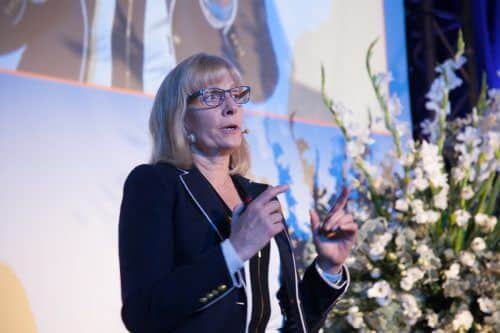Deborah Disenzo, CEO of IBM Watson Health at the Mixiii-Biomed 2017 conference: "We are at the peak of the development of the 'Watson' system and its integration into health systems to enhance patient care thanks to unique functions: helping doctors, learning medical articles and procedures and in-depth and fast analysis of medical conditions to create treatment procedures news". * Stuart Barish, Health Care Banking group: "The Israeli biotech companies do not run clinical tests in an optimal way like in the USA - the standards of the FDA".

As part of the second day of the 2017 Mixiii Biomed conference (on May 24), several sessions were held that dealt with the issues of aging from different angles, including: the role of robotics in old age, cell renewal and solutions in the field of digital medicine for the aging population.
Deborah DiSenzo, CEO of IBM Watson Health She told the opening plenary of the second day of the conference that the IBM Watson Health system is a new advanced software with unique functions that will help doctors locate information, analyze medical conditions, draw quick and efficient conclusions through the use of deep learning techniques. The system is very sophisticated and can return to any article, book and medical knowledge it has learned in minutes. In addition, the system learned from world-class senior oncologists. As time passes, the system learns about diseases faster (with the improvement of its learning technology) and thus its level of accuracy will rise to perfection. "The Watson system has the ability to connect a number of sources of information to search for a cure for diseases: public medical information, information on the human genome and more," explains Disenzo and adds, "the system has already shown positive results in finding a certain protein in the brain that it associates with an effect on Parkinson's disease. After the link it made, the system referred to certain drugs, which were associated with the treatment of other diseases: the process took several weeks, compared to the years it takes scientists on their own to reach such a discovery."
Later, as part of a session that dealt with robotics in the medical service for the adolescent population, solutions in the form of robots were discussed that would make life easier for the elderly, improve their lifestyle and relieve situations of loneliness, forgetfulness, depression and more.
Dr. Amit Gofer, UpNRide Robotics: "Our development is the 'next generation of mobility devices'. This is a wheelchair that allows movement at eye level and transition from a sitting position to a standing position while maintaining self-balance. Today there are around 70 million wheelchairs around the world, the use of which affects the quality of life of their users and, as in many fields, wheelchairs are also slowly becoming "smart". Dr. Filippo Cabello, author The Biorobotics institute added: "By the year 2060 there will be only one potential service provider for 51 elderly service seekers - this is a huge potential gap between supply and demand. The decrease in the share of the working population in society will lead to an increase in the demand for nursing workers by another 94% by 2025, as well as a general increasing need for a higher level of service and assistance in the future. Today one out of three nursing brothers and sisters are injured as a result of carrying non-ambulatory patients. Each injury costs the employer $35,000. The robot we developed will not replace the service providers but will allow them to focus on the more important jobs and double their strength."

In a parallel session held- Digital health for the elderly, dealt with the digital solutions being recruited into the ranks of medicine these days, which may improve the lives of the aging population through a combination of technology and biology. Ruthie Ader, head of the Strategy and Innovation Center, Samsung: "Today, the integration of information technology in health systems is very important and holds a lot of promise for the field of Digital Health. Global health is the biggest challenge we have and at the same time also an opportunity. This is the topic that is going to occupy and affect our lives everywhere in the coming years. The combination of technology and biology is also of great importance. Technology has a lot of ability to influence what is done these days in biological research and in finding solutions for the health system and various ailments."
"We look at the population as 'health consumers' - mainly because of the needs that exist at the age of 70 and over", added Adar and continued, "people forget to make appointments with doctors, take medicines and more. A 65-year-old woman in Miami is different from her counterpart in Israel or her counterpart in Japan, because of the lifestyle. We need to know how to adapt personal care to each person. Especially in Israel - there are the tools to diagnose this and analyze the effectiveness of the drug on its users and the prediction of its success based on the existing medical data. Samsung is in a unique place. More than a billion people buy our phones. We have a huge platform that provides recommendations and services. Little by little we will penetrate your cars as well."
Later, commercial and banking people talked about the right way to finance a medical startup at the beginning. Ronan Ginor, Orbimed: "Bankers should be approached at an early stage on the way to a medical start-up, because they can present data on the state of the market and thus prevent failures: it is much easier to sell people things they want than things you want and there is no need for this in the market."
Stewart Barish Notebook Health Care Banking group He pointed out that the Israeli biotech companies do not run clinical tests optimally like in the US: "You have to take the FDA standards seriously. The clinical tests need to be longer and larger in scope and the costs for this are worthwhile. A company at the beginning of its journey should not find partners for a promising product due to the difficulty in bringing such a product to the market and its medical approval. It is advisable to invest alone in the product and after its success it is better to examine entering into a partnership for the purpose of additional ideas for promising products".
